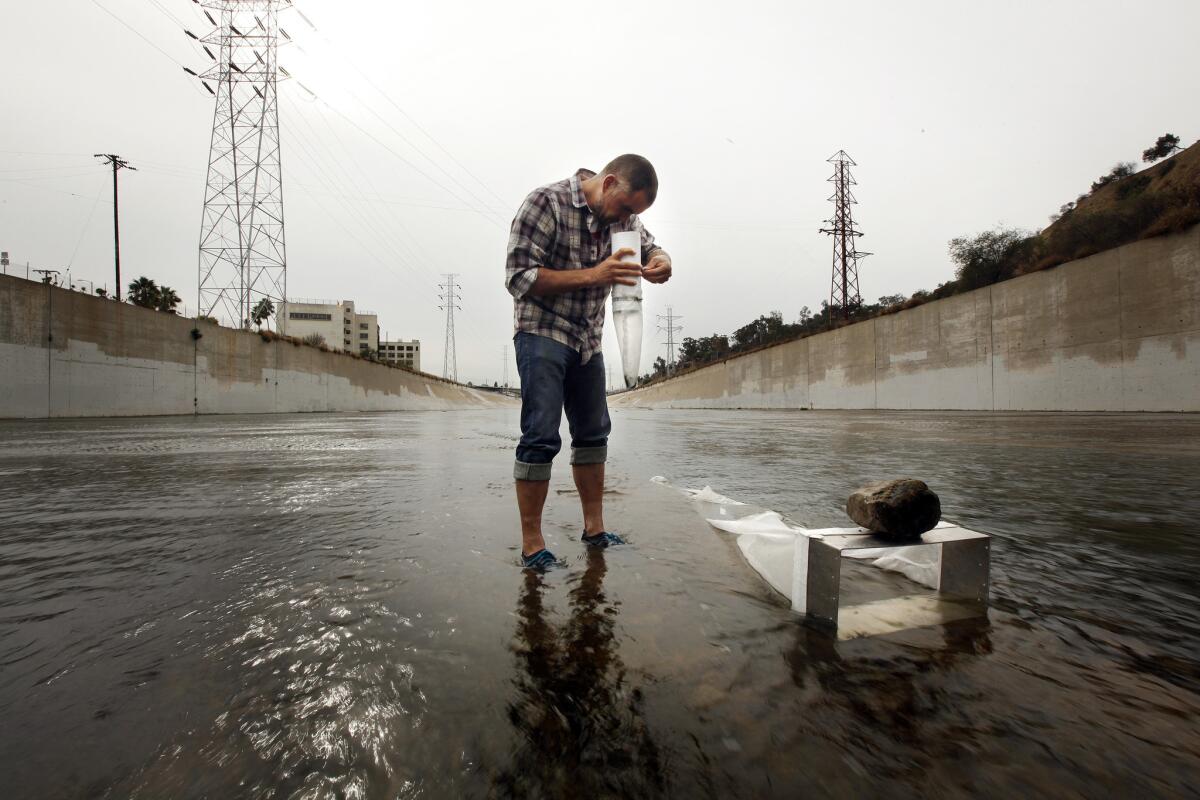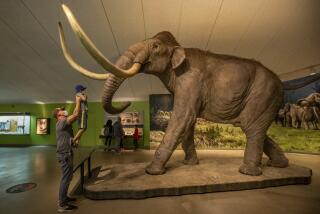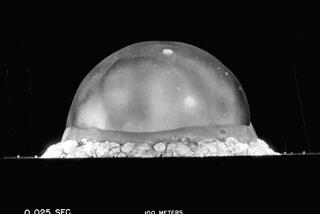Opinion: Welcome to the dawning of the Age of Anthropocene

Environmental activist and scientist Marcus Eriksen collects a sample in 2014 of plastic particles making their way via the Los Angeles River to the ocean, where some will join the sediment. Some scientists say plastic deposits and other detritus of human development mark the beginning of a new geologic era.
How much has human technological progress affected the planet? Enough, some scientists say, that it’s time to declare we are in a new geologic era. Welcome to the Anthropocene Epoch.
In an article published in Science on Thursday, a group of scientists add to recent arguments that human use of concrete and plastics, not to mention all those fossil fuels we’ve burned, has altered the Earth sufficiently to declare the end of the Holocene Epoch, which began about 12,000 years ago with the ascent of humans.
Join the conversation on Facebook >>
Over the last 70 years, we’ve really distinguished ourselves from our Holocene ancestors by generating “unprecedented combinations of plastics, fly ash, radionuclides, metals, pesticides, reactive nitrogen, and consequences of increasing greenhouse gas concentrations” that are discernible in deposit layers in glaciers, lake beds and other stratigraphic records, according to an abstract of the report. “The appearance of manufactured materials in sediments, including aluminum, plastics, and concrete, coincides with global spikes in fallout radionuclides and particulates from fossil fuel combustion. Carbon, nitrogen, and phosphorus cycles have been substantially modified over the past century.”
In other words, that man-propelled global warming that so many of the Republican presidential contenders disbelieve is happening has combined with the rest of modern life’s detritus to leave an imprint that scientists centuries from now (well, if any survive) will be able to read by taking core samples from the earth (but probably not glaciers, because we’re melting them away).
The environmental impact of all that progress could have a similar effect to the asteroid strike that killed off the dinosaurs, the last of five “great extinctions.”
The Guardian reports that the organization that sets such definitions, the International Commission on Stratigraphy, could vote on it later this year.
So when was the dawn of the age of Anthropocene (to borrow the title of an old pop tune)? The mid-1900s, with the development of atomic weapons and energy, the rapid growth in both population and industrialization, and the rise of such products as plastics.
To be sure, the technological advances have made human existence unique in the history of the planet, and that means I get to write this on an electric-powered laptop in my home office with the furnace running rather than inking up some papyrus over a fire in my hut. But the environmental impact of all that progress could have a similar effect to the asteroid strike that killed off the dinosaurs, the last of five “great extinctions” scientists have identified. And many believe we are in the midst of a sixth great extinction -- this one caused not by a massive rock from outer space or volcanic eruptions from the earth itself, but by us. And the evidence will be part of the geologic record we’re leaving behind, as well.
To some, it’s a bit of a stretch to go naming a new epoch while we’re in its early days. Kind of like writing history as it happens.
“It’s really rather too near the present day for us to be really getting our teeth into this one,” Cambridge University geologist Phil Gibbard told the Guardian. “That’s not to say I or any of my colleagues are climate change deniers or anything of that kind, we fully recognize the points: the data and science is there. What we question is the philosophy, and usefulness. It’s like having a spanner but no use for it.”
Maybe. But at a time when positive human action to counter negative human action is critical, and perhaps too late, a new designation could help focus attention on the seriousness of the hole we’ve dug for ourselves. I’m not suggesting political considerations should affect a scientific designation, but it certainly would come in handy.
Remember, the new climate agreement reached in Paris last month, in which nearly 200 countries committed to cutting their carbon footprints, coincides with revelations that Volkswagen lied about emissions from its vehicles, Los Angeles port officials let a shipping line ignore agreed-to emissions controls, and the U.S. decided to let oil companies resume exporting oil, the wrong step when you’re trying to reduce its use. So on the one hand, the world recognizes we need to change. On the other hand, it’s the same old same old.
How will the epoch end, and when? There’s no way to predict. But that “Anthropocene Park” movie that follows ought to be a real downer.
Follow Scott Martelle on Twitter @smartelle.
MORE FROM OPINION
Why Israel’s schools merit a U.S. boycott
Are we making too much of ‘Making a Murderer’?
Feds serve up more dietary guidelines for Americans to ignore
More to Read
A cure for the common opinion
Get thought-provoking perspectives with our weekly newsletter.
You may occasionally receive promotional content from the Los Angeles Times.











